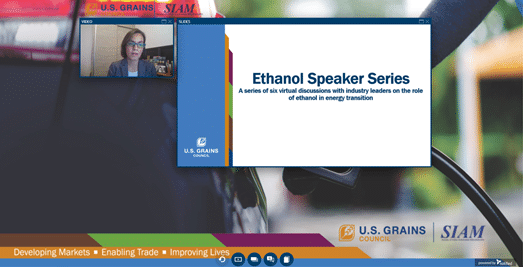As part of a coordinated effort to educate ethanol stakeholders in India about the advantages of biofuels, the U.S. Grains Council’s (USGC’s) South Asia office has undertaken a monthly speaker series starting in October 2021 and is set to wrap up in March 2022.
“The idea of this series was to dispel some of the myths around ethanol, showcase some of the exciting ideas and innovations emerging globally and position USGC as a knowledgeable partner in India’s ethanol transition,” said Alejandra Danielson Castillo, USGC director for the South Asia region.
The series kicked off with an installment that examined the role of biofuels in achieving net zero emissions. Attendees heard from Gillian Harrison, CEO at Whitefox, a renewable energy semiconductor manufacturing company. Harrison praised the ethanol industry for its progress and stressed the importance of considering all industry sectors when sourcing ways to reduce emissions.
“This isn’t a question of focusing on certain sectors, we need to look at what we can do in all areas,” Harrison said. “The ethanol industry is really in a great position; we already exist, and this isn’t a new technology or a new renewable we need to develop. Ethanol can be produced globally, and it can drive emissions reductions across multiple sectors.”
In November, participants heard from Dr. Robert McCormick, a research fellow at the National Renewable Energy Laboratory (NREL), a federal laboratory dedicated to the research, development, commercialization and the deployment of renewable energy and energy efficiency technologies, as well as P.K. Banerjee, executive director of the Society of Indian Automobile Manufacturers (SIAM), on NREL’s Global Ethanol Blended Fuel Vehicle Compatibility Study. This session garnered attention from the Indian automotive sector, which is working to transition its vehicle fleet to accommodate higher ethanol blends.
In December, participants learned more about the International Energy Agency’s (IEA) net zero pathway and the role of biofuels in achieving net zero emissions with Jeremy Moorhouse, IEA bioenergy analyst.
“Policies and the context in specific countries are really driving where fuels grow. A lot of ethanol’s growth between 2022 and 2026 will be happening in Brazil and in Asia,” Moorhouse said. “In Asia, that is primarily India’s pursuit of its 20 percent blending target, and in Brazil, part of that is recovery and another part of that comes from Brazil’s existing suite of policies for ethanol: mandates, consumer purchases and also its RenovaBio program.”
POET’s Vice President of Corporate Affairs Doug Berven, a member of the Council’s Ethanol Advisory Team welcomed attendees into the new year as the speaker in January. Berven discussed the potential for ethanol to lead the way in carbon neutral transportation, while examining cutting edge ethanol technology. February’s speaker, Kevin Lindemer, executive director of oil markets and downstream consulting at IHS Markit, will present on Feb. 28. The series will close with a discussion on the findings of the Tamil Nadu Cane Sector Survey.
“By the end of our six-part series, we hope that stakeholders across the ecosystem will look to USGC as the foremost authority on all things ethanol. We are excited to see India’s pivot to corn ethanol and see potential for greater collaboration between the two countries,” Danielson Castillo said.

